 Editorial note: as part of a discussion about Christian speculative fiction at Mike Duran’s blog, I challenged him to read one of several recent novels released by traditional Christian publishers and answer for himself the questions he posed in his article. He accepted the challenge and selected A Cast of Stones by Patrick Carr. In addition, he invited his Facebook friends to join him (see for example, Katherine Coble’s review). A lively discussion ensued, in part prompted by Mike’s review and those by participants in the CSFF Blog Tour featuring the book the same week. Here is Patrick’s answer to some of the issues that cropped up in the discussions.
Editorial note: as part of a discussion about Christian speculative fiction at Mike Duran’s blog, I challenged him to read one of several recent novels released by traditional Christian publishers and answer for himself the questions he posed in his article. He accepted the challenge and selected A Cast of Stones by Patrick Carr. In addition, he invited his Facebook friends to join him (see for example, Katherine Coble’s review). A lively discussion ensued, in part prompted by Mike’s review and those by participants in the CSFF Blog Tour featuring the book the same week. Here is Patrick’s answer to some of the issues that cropped up in the discussions.
Becky
– – – – –
When I discovered that my first book, A Cast of Stones was not only going to be reviewed on the CSFF Blog Tour but would also be examined as an indicator of the state of Christian Fiction, I was thrilled. What author wouldnât be pleased with a âtwoferâ for their work?
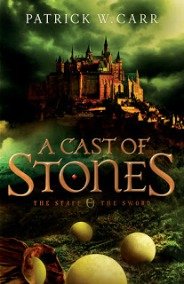 When the reviews came in, however, I admit to feeling somewhat like a lab rat in the midst of a psychological experiment. Not only was my book being critiqued, but my editors, my publisher, and the entire industry was as well. Many of the remarks and criticisms were spot on. Others, however logical, missed the mark. So I asked Rebecca Luella Miller if she would entertain a response and to my delight, she agreed! Thank you, Becky.
When the reviews came in, however, I admit to feeling somewhat like a lab rat in the midst of a psychological experiment. Not only was my book being critiqued, but my editors, my publisher, and the entire industry was as well. Many of the remarks and criticisms were spot on. Others, however logical, missed the mark. So I asked Rebecca Luella Miller if she would entertain a response and to my delight, she agreed! Thank you, Becky.
Letâs address the content first. Or rather, letâs address whatâs in the book and whatâs NOT in the book. First, my protagonist is a drunk. This was always my intention because I wanted to show that a deeply flawed character could rise to be a hero. I chose drunkenness because itâs a very visual defect and lent itself well to description.
The editors at Bethany House never blinked an eye at using a drunk who literally has to crawl from the muck at the beginning of my book. As far as I know, there was never even a discussion at softening or changing my characterâs obvious flaw. I was pleased that people, for the most part, seemed to take to Errol. Early on, when I submitted A Cast of Stones to the ACFW Genesis contest, one of the judges told me no major publisher would be interested in a drunk as a protagonist. I was happy to find they were wrong.
But the criticism has been posited that I should have had more realistic language and sex in the book as well. People have assumed that this was Bethany Houseâs decision. This is logical, perhaps, but incorrect. I donât know whether my editors would have allowed more graphic language and relations than I wrote. To be frank, they never got the chance. Maybe if I thought I could handle it deftly enough, they would have had the opportunity.
The decision, however, was mine, not theirs.
My reason? I have read any number of excellent fantasy novels, and I mean ABA secular works, that have no language or overt sex in them. Take a read through David Eddingâs Belgariad or Raymond E. Feistâs Magician or Orson Scott Cardâs Enderâs Game if you doubt.
Let me address the language first. I was writing a fantasy, a different place in a different world in a different time. Modern swear words would be anachronistic and would only serve to distract the reader and pull them out of the story world I hoped to create. I could have devised a swear-word set similar to the one Robert Jordan created for The Wheel of Time, but it would have required a LOT of repetition to establish in the readerâs mind, and quite honestly I didnât want to sacrifice the word count it would have required.
Now, letâs talk about sex. After all, if Solomon can talk about it in graphic, albeit symbolic, terms, why shouldnât Christian writers? Simply put, I didnât want the burdens those scenes would place on me. Are my scenes perfectly realistic? No. But I didnât want to climb inside the mind of a nineteen-year old male and recount those sorts of thoughts. The only reference I had access to was my own set of memories, and I am frankly unwilling to unpack those attitudes and images and place them in my prose.
Why not? you might well ask. Shouldnât our fiction be real?
There were a few reasons, and I will list them in reverse order of importance.
First, I am something of a public figure. I teach middle school and high school and I try to interact with my students in more than just an academic fashion. I want them to know that I love them and pray for them. I donât want to confuse their perception by having them read sex scenes written by their geometry teacher. Some of my students are 12-years old and many of them have read my book even though the target audience is admittedly a bit older. Many of my students have yet to develop a sufficiently nuanced view of the world and I didnât want my witness to suffer.
Second, Iâm a father. Children are often acutely aware of what their parents do or say and I was very aware of this fact when Bethany House awarded me a contract for my work. Even though my sons are of an age where they can see me as a man and not just a father, they are still my children. They all have a rather whimsical sense of humor and I can imagine what they might say after reading some ârealisticâ language and sex in my book. âHey Dad, do you actually kiss mom with that mouth?â
But the most important reason is my last. I REMEMBER what it was like to be an adolescent male. Maybe I was the exception, but I thought about sex a lot. My awareness of girls and the knowledge of sex were new and mysterious and the passages I read in some of my books only served to fire my imagination. We live in a society where our children are bombarded with images of sex and highly sexualized behavior every day, and I believe young males are particularly vulnerable in this regard.
There is a fine line between describing something and glorifying it. My books contain violence, but I was careful not to revel in it like so many of our movies do. Likewise, I didnât want to be responsible for inciting something in my readers that would lead them to objectify women. There is too much of that occurring already. Instead, I wanted my fiction to offer them a place where they can be free from those attacks for a while.
Bethany House never needed to say anything to me in this regard. So the discussion about what to include or not include in my book, while entertaining, misses the mark. A Cast of Stones could have easily been published by a mainstream, secular house. I think it is good enough. In fact, I have tried repeatedly to have it shelved in the bookstores with science fiction and fantasy instead of Christian fiction.
But even if my work had been published by TOR or Del Rey, the content would NOT have been measurably different.
What would have been different? The length. The criticism has been laid at my feet that the books are too short. They lack sufficient world-building and description and thus fall short of works by Jordan, Rothfuss, and Martin. Well, thereâs only one thing I can say.
Youâre right.
But there are two reasons for this. One, Bethany House knows their audience better than I. A massive fantasy tome was deemed too big of a risk. Publishers are businesses. They have costs, payroll, and a bottom line. They need to make a profit to stay in business and, quite frankly, the Christian market for a massive trilogy is limited, precisely because we canât get our works shelved with mainstream science fiction and fantasy.
Two, Iâm a new author. I donât have an existing fan base to draw upon to mitigate the financial risks that a long fantasy trilogy would create. I hope to change that, but the secular publishing world treats their authors the same. If you donât believe me, take a look at how J. K. Rowlingâs books changed once sheâd proven her market draw or observe how Guy Kayâs book length expanded after the success of his initial Fionavar Tapestry, a trilogy of three fairly brief works.
I would have loved another fifty thousand words per novel to flesh out my world and lend it depth, but realistically, that will have to wait. Given the constraints, I had to make the decision to either abbreviate the world-building or skimp on the story. I chose the former and I think the reception and reviews of the people who have read the book indicate I made the right choice. Many have applauded me for creating an epic fantasy that is more âreadableâ than most.
So there you have it. I canât speak for âChristian Publishing.â But in my opinion, some of the discussions miss the point. My novel is not substantially different from, say, Enderâs Game, Magician, or The Belgariad. Where it is different, I hope, is that people can see the allegory and symbolism in my work and that God will be glorified.
 Readers, have you ever wished you could find more fantastic fiction out there? In my lifetime we experienced a huge dry period:  I read Tolkien and Lewis, and then for years found nothing more. As a young adult, I re-read The Lord of the Rings a hundred times — every time I got sick.
Readers, have you ever wished you could find more fantastic fiction out there? In my lifetime we experienced a huge dry period:  I read Tolkien and Lewis, and then for years found nothing more. As a young adult, I re-read The Lord of the Rings a hundred times — every time I got sick.
































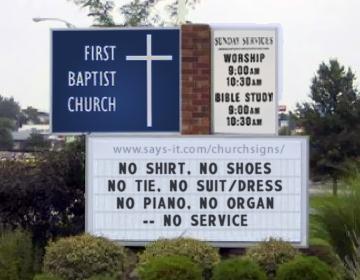

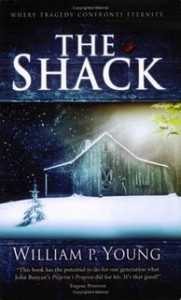











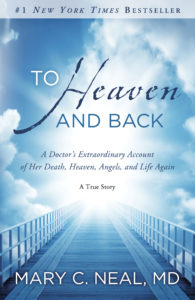
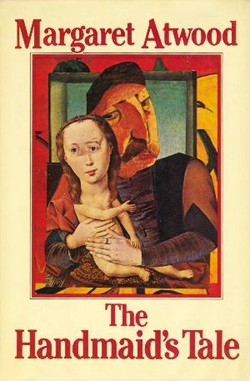






 When the reviews came in, however, I admit to feeling somewhat like a lab rat in the midst of a psychological experiment. Not only was my book being critiqued, but my editors, my publisher, and the entire industry was as well. Many of the remarks and criticisms were spot on. Others, however logical, missed the mark. So I asked Rebecca Luella Miller if she would entertain a response and to my delight, she agreed! Thank you, Becky.
When the reviews came in, however, I admit to feeling somewhat like a lab rat in the midst of a psychological experiment. Not only was my book being critiqued, but my editors, my publisher, and the entire industry was as well. Many of the remarks and criticisms were spot on. Others, however logical, missed the mark. So I asked Rebecca Luella Miller if she would entertain a response and to my delight, she agreed! Thank you, Becky.





